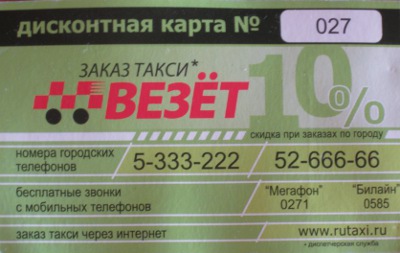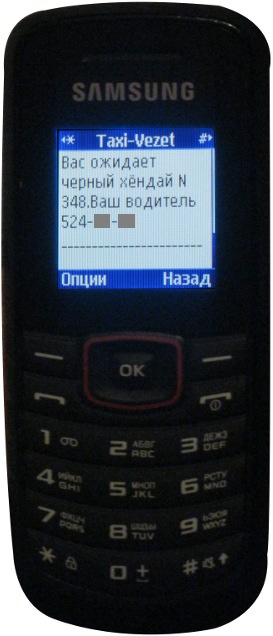Category: "Transportation"
Такси
The Russian word for taxi is такси. It is an indeclinable neuter noun, which means it never changes its endings:
| Sg | Pl | |
| Nom | такси | |
| Acc | ||
| Gen | ||
| Pre | ||
| Dat | ||
| Ins | ||
Adjectives that modify indeclinable nouns must still occur in the case form required by the context:
| Nom | Вот жёлтое такси. | Here's the yellow taxi. |
| Acc | Я вижу жёлтое такси. | I see a yellow taxi. |
| Gen | Он стоял около жёлтого такси. | He stood near a yellow taxi. |
| Pre | Он приехал на жёлтом такси. | He arrived in a yellow taxi. |
| Dat | Она подошла к жёлтому такси. | She walked up to the yellow taxi. |
| Ins | Мы стояли перед жёлтым такси. | We were standing in front of a yellow taxi. |
Of course those are all possible in the plural as well:
| Nom | Вот жёлтые такси. | Here are the yellow taxis. |
| Acc | Я вижу жёлтые такси. | I see the yellow taxis. |
| Gen | Они стояли около жёлтых такси. | They were standing near the yellow taxis. |
| Pre | Они приехали на жёлтых такси. | They arrived in yellow taxis. |
| Dat | Она подошла к жёлтым такси. | She walked up to the yellow taxis. |
| Ins | Мы стояли перед жёлтыми такси. | We were standing in front of the yellow taxis. |
Since Russians usually don't own cars, they use taxis a lot more than most Americans. This last summer in Kazan I used them constantly. To my surprise, when I bought tickets at the movie theater at Кольцо, I was given a discount taxi card:

I'm Scottish by descent, and let me tell you that we Scots hate paying more than we have to. For us, receiving a discount card is like... gosh... what can I compare it to? It's like getting free and painless high-quality dental work. I mean, you just can't think of anything better. I used that discount card all the time. And what's even better is that when you order your cab using your cell phone, they automatically pick up your number and when your taxi arrives, you usually get a text message saying that it has arrived. For instance, here is a text message I received:

It reads, “Black Hyundai #348 is waiting for you. The driver's number is 524-XX-XX.” Most taxis don't have a taxi sign on them, so that information is really convenient. Why the heck haven't American taxis picked up such a common-sensical idea?
Taxi service is reasonably priced in Kazan, but I wouldn't be surprised if it triples over the next year. Some regulations are going into effect that will increase the fees taxi drivers have to pay, which will probably result in less competition. I'm not looking forward to the change.
Автобус (часть вторая)
The Russian word for bus, as in public transport, is автобус. It is a perfectly regular first declension noun. Public transport is well developed in large Russian cities, so it's a perfectly normal of the Russian daily routine to ride a bus. To say you are riding “on a bus/by bus” most often they use the preposition на followed by the prepositional case, but occasionally you'll find a bare instrumental case used without a preposition:
| Каждый день я езжу на работу на автобусе. | Every day I take the bus to work. |
| Сегодня я приехал домой автобусом. | I came home today on the bus. |
If something happens inside the bus, then of course you use в + prepositional:
| В автобусе было столько народу! | There were so many people in the bus! |
| Ненавижу, когда молодые люди сидят и целуются в автобусе. Как им не стыдно? | I hate it when kids sit in the bus and make out. They should be ashamed of themselves. |
Although автобус is a fairly simple word, it's the verbs used with it they are sometimes surprising to English speakers. For instance, the most common way to say “to get on the bus” is “to sit into the bus” in Russian, using the verb pair садиться/сесть:
| Подозреваемый сел в автобус в восемь часов. | The suspect got on the bus at eight o'clock. |
| Каждое утро я сажусь в автобус и еду на работу. | Every morning I get on the bus and go to work. |
When you get off the bus, Russians either say “to step down from the bus” сходить/сойти or “to exit from the bus” выходить/выйти:
| Хулиган сошёл с автобуса. | The punk got off the bus. |
| Француженка вышла из автобуса. | The French woman got off the bus. |
Корабль
The Russian word for ship is корабль. When I was a little girl, I always wanted to take a ride on a ship because I loved the ocean. My dream finally came true when my uncle rented a ship and we went sailing in the Black Sea. My mom surprised me when she said «На следующей неделе мы все поедем кататься на корабле!» “Next week all of us will go for a ride on а ship!” All week I worked hard on packing my bags though we were only going for one day. I brought everything with me even though my mom constantly told me «Оля, ты слишком много берешь вещей» “Olga, you are bringing too many things.”
Next week, we woke up early in the morning to get ready for the exciting day. I remember that it was very windy that day and my excitement grew even more because I knew there would be big waves. Once we were sailing on the ship, I pulled out my chair and sat down with a blanket and a cup of tea. With the cool breeze running through my hair, I said «Сегодня море очень красивое, потому что волны большие» “Today the ocean is very beautiful because the waves are big.” As I sat, I thought I noticed a dolphin and I jumped out of my seat and yelled «Смотрите! Я вижу дельфина!» “Look! I see a dolphin.” It turned out that what I thought was a dolphin was actually just a large fish. I was disappointed, but I still had a relaxing time while I watched the beautiful waves.
Поезд
The Russian word for train is поезд. Trains are a very common means of transportation in many parts of Russia. As a child, I lived and attended school in Ukraine which was very stressful at times because of the huge work load. As a part of my summer vacation, I traveled to visit my aunt in Moscow. My parents and I took the train from Lvov to Moscow, which took approximately 24 hours. Part of the reason I enjoyed seeing my aunt so much was because the train ride was a very exciting and fun experience for me. I always brought my toys with me and my parents brought food and comfy pillows to sleep on.
As we boarded the train, the train attendant called out «Внимание! Наш поезд отправляется» “Attention! Our train is leaving.” I quickly took a seat by the window and my parents ordered me a cup of tea from the train attendant «Я хочу купить одну кружку чая, пожайлуста» “I would like to buy one cup of tea please.” During our ride, My dad and I played cards карты which was very exciting because I beat him that time!
As the train approached Moscow, the train attendant called out «Внимание! Следующая станция Москва» “Attention! The next station is Moscow”. As we began making our way towards the exit, a lady in front of us dropped a basketful of apples on the floor and everyone was held back while she tried to pick them up. This was very troubling news for everyone who was trying to exit the train because the hallway was crowded and there was only one way out of the train. I began to panic because the train was going to depart again in a few minutes! I heard people yelling «Разрешите пройти! Нам нужно выйти» “let us through! We need to exit.” Fortunately, the lady picked up her apples quickly and we exited the train just as it was beginning to depart again.
Мотоцикл
The Russian word for motorcycle is мотоцикл. Motorcycles are commonly used by many people in Russia. When I was 6 years old, my grandfather bought his first motorcycle. He came home that day very jolly and invited everyone to look at it. He said «Посмотрите на мой мотоцикл!» “Look at my motorcycle!” The new motorcycle gave my grandparents the opportunity to take more trips to places that they could not have traveled to before. It also gave me an opportunity to experience my first ride in a motorcycle. When my grandfather first bought his motorcycle, he asked me if I wanted to go for a ride with him. He said to me «Ты хочешь прокататься на мотоцикле?» “Do you want to take a ride on the motorcycle?”. Initially, I was unsure and felt anxious but eventually I agreed and was surprised by how much I enjoyed it. The breeze felt wonderful and I felt as if I was on a very fast bike that required no energy to make it run. After that first ride, I took every opportunity to ride the motorcycle with my grandfather. I said to all my friends «Я люблю ездить на мотоцикле с моим дедушкой!» “I love to ride on the motorcycle with my grandfather!”